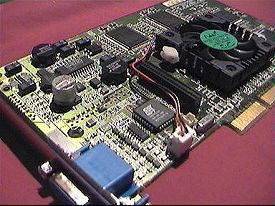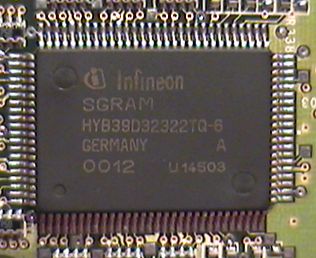Elsa Gladiac GTS Specification
The Elsa range continues, with this card 32MB of 333Mhz DDR RAM backed up with the Geforce 2 chipset, clocked at the default 200Mhz core speed, the 333Mhz memory provides 5.3GB/s transfersThe card follows the basic reference Nvidia design, the card I received actually had prototype sticker stuck on the back.
 The
Elsa retail box
The
Elsa retail box

Nifty eh (O:
The fan and heatsink are standard equipment on most Geforce's the fan seems to be a hyprobearing type.
There are no snazzy extra connectors on the card I'm reviewing, just the plain monitor connection, there are solder points on the board, no doubt for the usual array of goodie's that Elsa seem to include with their graphics cards.
Here are a few pictures of the card before I installed it (O:


and a close up of the ubiquitous Infineon DDR RAM.

The Infineon DDR ram is fitted on all the Geforce's that I have seen in this case it is 6ns rated at 166Mhz, - 333Mhz DDR this is standard fare on all but the Geforce 2 Ultra which is fitted with 4ns RAM, rated at 230Mhz -460Mhz DDR
I did manage to overclock the Gladiac to 220 core 395 memory as shown below, and it did make quite a large impact on the scores in Quake 3.

DDR Ram is Easily identified by the fact that it has connector pins
on all 4 sides of the chip. SDRAM as fitted to the Elsa Geforce 2 MX only
has connectors on 2 sides.
| Features | ||||||||||||||||||||||||||||||||||||
| Graphics processor | NVIDIA GeForce2 GTS | |||||||||||||||||||||||||||||||||||
| RAMDAC/pixel clock | 350 MHz | |||||||||||||||||||||||||||||||||||
| Memory equipment | 32MB DDR RAM | |||||||||||||||||||||||||||||||||||
| BIOS | VESA BIOS 3.0 support | |||||||||||||||||||||||||||||||||||
| Bus system | AGP 2x/4x, including fast writes and execute mode | |||||||||||||||||||||||||||||||||||
| Features | ||||||||||||||||||||||||||||||||||||
| Graphics standards | Direct3D, OpenGL, DirectX7, DirectDraw, DirectShow | |||||||||||||||||||||||||||||||||||
| 2D hardware features | 256-bit 2D acceleration, optimised for 32, 24, 16, 15, and 8-bit colour depths, hardware cursor in TrueColor, multi-buffering (2x, 3x and 4x for flowing movement and video playback) | |||||||||||||||||||||||||||||||||||
| 3D-hardware features | 256-bit engine with HyperTexel architecture, optimised Direct3D and OpenGL acceleration, complete DirectX7 support, 32-bit Z and stencil buffer, Single pass multi-texturing, anti-aliasing, high-quality texture filtering, including anisotropic; advanced per-pixel texturing for perspective correction, fog and depth cueing, texture compression | |||||||||||||||||||||||||||||||||||
| HDTV and DVD playback | Enhanced motion compensation for full-screen video playback at all DVD and HDTV resolutions, video acceleration for MPEG -1, MPEG-2 and Indeo | |||||||||||||||||||||||||||||||||||
| Standards | DPMS, DDC2B, plug&play; | |||||||||||||||||||||||||||||||||||
| Ports | Monitor: D-shell (15 pin)
With optional video module: 1 x video-in and 1 x video-out |
|||||||||||||||||||||||||||||||||||
| Dimensions | 173 x 108 mm (ATX format, not including mounting bracket) | |||||||||||||||||||||||||||||||||||
|
||||||||||||||||||||||||||||||||||||
| The values specified here are maximum values which, under some operating conditions, may not always be achieved. Other graphics modes are easily configured in Windows. | ||||||||||||||||||||||||||||||||||||
Enough with the introductions, lets see what these two cards can do (O:, Lets see some benchmarks









